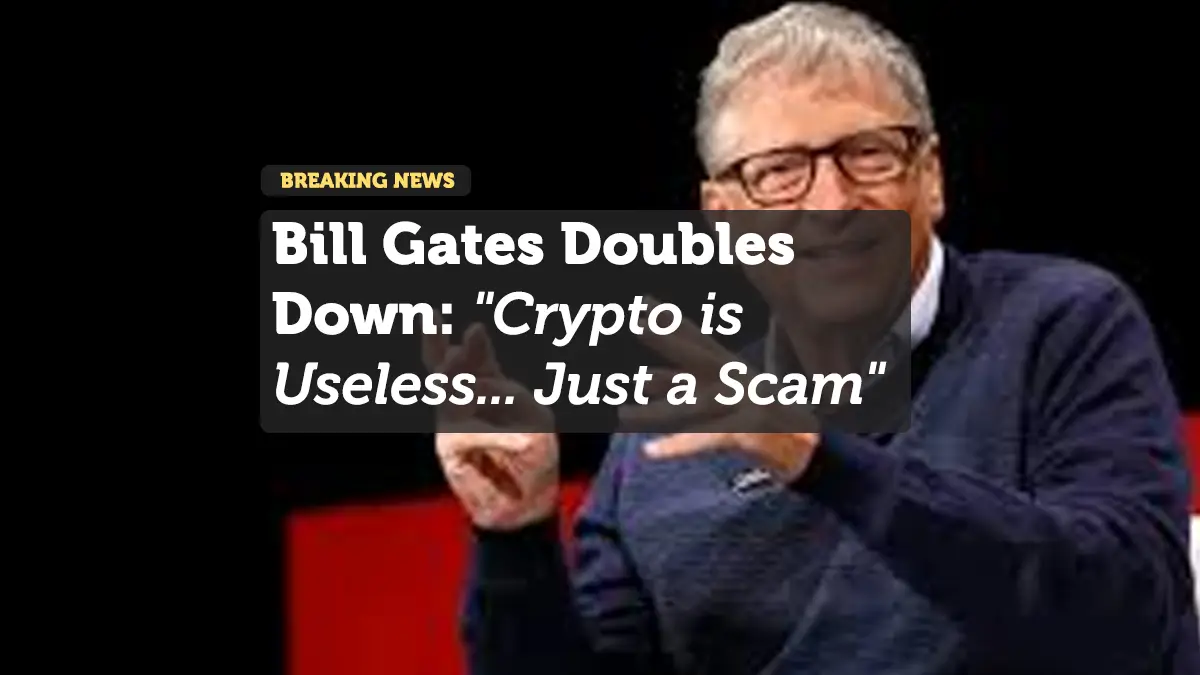
Bill Gates Doubles Down: “Crypto is Useless… Just a Scam”
Bill Gates has been one of the most vocal critics of cryptocurrency, and his latest remarks show that his position hasn’t changed. In a February 1, 2025, interview with The New York Times, Gates dismissed crypto as having “no use cases” and being “just a scam.”
His criticisms, which have remained consistent over the years, focus on crypto’s speculative nature, its role in illegal activities, and its environmental impact. However, many in the tech and crypto space argue that his views ignore blockchain’s growing role in finance, decentralization, and innovation.
Let’s break down Gates’s arguments, the counterarguments from crypto advocates, and whether his claims hold up in today’s digital economy.
Bill Gates’s Main Criticisms of Cryptocurrency
1. Crypto Has No Real-World Use Cases
Gates has repeatedly stated that cryptocurrencies lack intrinsic value and do not contribute to society in a meaningful way.
- He argues that traditional investments (such as stocks, businesses, or infrastructure) create tangible benefits, while crypto relies solely on speculation.
- In his latest interview, Gates said, “Crypto doesn’t produce anything. It’s just a game of who can sell to the next fool at a higher price.”
- He compares crypto to the dot-com bubble and “greater fool theory” investing, where value depends only on finding someone willing to pay more.
Counterargument: Crypto Enables Financial Innovation
- Financial Inclusion: Crypto provides banking services to the unbanked, especially in developing nations where traditional banks have failed.
- Cross-Border Payments: Bitcoin and stablecoins allow faster, cheaper international transfers compared to traditional remittance services.
- Smart Contracts & Decentralization: Platforms like Ethereum enable automated contracts, reducing reliance on banks and intermediaries.
- Store of Value: Bitcoin is seen by some as digital gold, offering protection against inflation and government currency manipulation.
2. Crypto is a Tool for Criminals
Gates has long associated cryptocurrencies with illegal activities, stating in 2018 that Bitcoin was being used to buy drugs “in a fairly direct way.”
In his 2025 interview, he emphasized:
- Crypto’s anonymity makes it a tool for money laundering, ransomware, and black-market transactions.
- Fentanyl sales and other illicit drug trades are facilitated by untraceable crypto payments.
- Unlike traditional finance, crypto lacks regulatory oversight, making it harder to track criminal activity.
Counterargument: Criminal Use of Crypto is Exaggerated
- Cash remains the primary method for illicit transactions, with crypto accounting for less than 1% of global crime-related payments (according to Chainalysis).
- Blockchain transactions are traceable, and governments now have advanced tools to track illicit funds on networks like Bitcoin and Ethereum.
- The rise of KYC (Know Your Customer) and AML (Anti-Money Laundering) regulations is making crypto exchanges more secure and compliant.
3. Bitcoin Mining is an Environmental Disaster
Gates has criticized Bitcoin’s energy-intensive mining process, stating in 2021 that “Bitcoin uses more electricity per transaction than any other method known to mankind.”
His concerns include:
- High carbon emissions from Bitcoin mining, which rivals the energy consumption of some countries.
- The impact of proof-of-work (PoW) mining on climate change.
- The need for more sustainable alternatives, such as government-backed digital currencies.
Counterargument: Crypto is Moving Toward Sustainability
- Many mining operations are now powered by renewable energy, reducing carbon footprints.
- Ethereum has switched to proof-of-stake (PoS), cutting energy usage by over 99%.
- Bitcoin mining is increasingly being used to stabilize power grids and utilize stranded energy sources.
4. NFTs and Crypto are a “Greater Fool Theory” Investment
In previous statements, Gates mocked NFTs and meme coins, calling them “100% based on greater fool theory.”
- He sees NFTs as speculative fads with no real-world value.
- Crypto projects, including Dogecoin and Shiba Inu, are purely hype-driven and lack fundamentals.
Counterargument: Web3 and Digital Ownership
- The rise of Web3 and digital ownership means NFTs and blockchain-based assets could revolutionize industries like gaming, art, and digital identity.
- Major corporations (Nike, Adidas, Starbucks) are already integrating NFT-based loyalty programs and virtual goods.
Bill Gates and Blockchain: A Contradictory View?
Interestingly, while Gates dismisses cryptocurrency, he has supported blockchain technology in other contexts.
- The Bill & Melinda Gates Foundation has funded blockchain-based projects for financial inclusion in developing countries.
- Microsoft, the company he co-founded, has experimented with blockchain for enterprise applications.
- Gates supports central bank digital currencies (CBDCs), which use blockchain but are government-controlled.
This suggests that while Gates opposes decentralized cryptocurrencies, he recognizes blockchain’s potential when controlled by governments or corporations.
Public and Crypto Community Reactions
Bill Gates’s anti-crypto stance has sparked debates across social media, particularly on X (formerly Twitter).
- Crypto advocates argue that Gates misunderstands the technology and is aligned with centralized financial interests.
- Others agree with Gates, stating that the speculative nature of crypto has led to widespread fraud and bubbles.
- Some point out that Gates’s past predictions have been wrong, including dismissing the internet’s potential in the 1990s.
Final Thoughts: Is Gates Right About Crypto?
While Bill Gates raises valid concerns about speculation, fraud, and environmental impact, his outright dismissal of crypto’s use cases is questionable.
Key Takeaways:
- Gates views crypto as a speculative bubble, but others see it as a tool for financial innovation.
- His concerns about crime and energy use are real, but the industry is actively addressing these issues.
- He supports blockchain technology, but only in centralized, government-controlled applications.
As crypto adoption continues to grow, Gates’s views may become increasingly outdated, especially as more real-world applications emerge in finance, governance, and beyond.
Whether one agrees with Gates or not, his comments reflect a broader debate about the future of money, decentralization, and technological progress.










